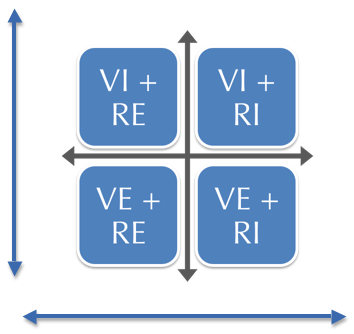A few days ago, a student of mine - a graduate of the Evolutionary Sales course -- asked me if fear could be useful.
Below is my response.
--
Of course fear *can* be useful. Anything is useful in *some* context.
And in any situation where we are discussing intra-personal matters (our relationship with ourselves) the question is: "do we need to use negative emotions for their usefulness-or is there a way to get the same outcome with a method that creates harmony rather than dissonance and dis-ease?
I think the answer is pretty obvious.
This does occasionally come up with clients around motivation; they are not sure how they will motivate themselves without anxiety. In that situation we have to work with their meta-program around motivation; are they motivated toward vision or away from pain. I have it that it is not a wiring thing (we are "just that way" but a matter of choice, training, and conditioning).
Having said that, if you remove fear and replace it with nothing in terms of motivation, then you will run into problems of ... well, "lethargy" is not quite it, but you get my meaning I trust.
Going into this deeper, let's distinguish what we mean by "fear". I see the following:
1) Fight or flight where your body is in physical danger (rational fear)
2) Fight or flight where we are not in physical danger (irrational fear)
3) Anxiety around not knowing how to do something and we are forced to do it (like land a plane when you are not a pilot and lives are at stake).
4) Anxiety or panic when we imagine some performance situation going poorly (presentations / public speaking, approaching someone we are attracted to, etc.)
#1 and #3 are fine. In fact, #1 is critical for our survival; it can be life saving.
#2 is an invention of our mind and is created by a combination of a lack of facility with self / lack of skill at navigating our interiors and insufficient self-esteem. It is also usually resulting from a gestalt of fear that can and should be cleared out of our past.
#4 is pretty straight forward: it is imagining a future event with a negative outcome. And since that future is a fantasy, imagining it not going well is ... well, silly. It may not be conscious- or it often is. If you imagine giving a presentation and having your notes fall to the floor or everybody scoffing at you, then you will have anxiety (and other emotions). However, if you imagine it going well -- that everything is going to be fine and you make that your internal representation of the event -- imagine that "movie" then you will feel much, much better.
I am not personally motivated away from pain - it has almost no impact on me because of the life I have had; I can deal with pretty much any level of pain. I have also systematically cleared out fear, anxiety, anger, etc., etc., etc. And having worked on my ego structures for nearly 25 years, there is almost nothing that I am not certain I can handle, so it is simply ineffective for me personally. In general, I am future oriented, vision oriented, and "toward" motivated.
I have often found though, that you have to resolve the fear, guilt, shame, etc., before you can take the necessary steps you need to take to get the thing done you need to get done, so how about we skip the negative vibrations in our nervous system, and find ways to motivate ourselves without the blunt instrument of fear? And as we imagine how much more spacious we feel, and how much cleaner and clearer our vessel / channel is, we can live our purpose even more fully because our vehicle (body/mind/spirit/nervous system) does not have dissonance in it that needs to be calmed.
When you realize that you are unborn; when you meet the face you had before your parents were born- the pure Witness, then life becomes lela or play and you can thrust yourself into it with full gusto because you realize that you can't really die.
At that point you have disidentified from that which you *think* is you, but is not really you and you have identified with the ever-present Witness. You have become God.


